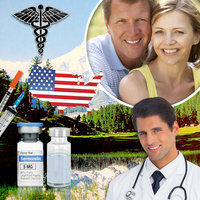Introduction to Primary Hypogonadism
Primary hypogonadism, a condition characterized by the failure of the testes to produce adequate levels of testosterone, presents unique challenges and considerations for American men. This endocrine disorder can lead to a myriad of symptoms including decreased libido, erectile dysfunction, infertility, and reduced muscle mass. Understanding the nuances of this condition is crucial for tailoring effective treatment plans that align with the lifestyle and health goals of affected individuals.
Diagnosis and Initial Assessment
The journey to managing primary hypogonadism begins with a thorough diagnosis. American men experiencing symptoms suggestive of this condition should undergo a comprehensive evaluation, including a detailed medical history, physical examination, and laboratory tests to measure serum testosterone levels. Additional tests, such as genetic screening for conditions like Klinefelter syndrome, may be warranted to pinpoint the underlying cause. Early and accurate diagnosis is pivotal in crafting a personalized treatment strategy.
Hormone Replacement Therapy: A Cornerstone of Treatment
For many American men with primary hypogonadism, hormone replacement therapy (HRT) stands as a cornerstone of treatment. HRT aims to restore testosterone levels to a normal range, thereby alleviating symptoms and improving quality of life. Various formulations of testosterone are available, including injections, gels, patches, and pellets, allowing for flexibility in administration based on patient preference and lifestyle. Regular monitoring of hormone levels and symptom relief is essential to adjust dosages and ensure optimal therapeutic outcomes.
Addressing Fertility Concerns
A significant concern for many American men with primary hypogonadism is the impact on fertility. While HRT can effectively manage symptoms, it may further suppress sperm production. For men desiring to preserve fertility, alternative treatments such as gonadotropin therapy, which stimulates the testes to produce both testosterone and sperm, may be considered. Collaboration with a fertility specialist can provide valuable guidance and support in navigating these complex decisions.
Lifestyle Modifications and Supportive Care
In addition to medical interventions, lifestyle modifications play a crucial role in managing primary hypogonadism. American men are encouraged to adopt a balanced diet rich in nutrients that support hormonal health, engage in regular physical activity to maintain muscle mass and bone density, and manage stress effectively. Supportive care, including psychological counseling and support groups, can also be beneficial in addressing the emotional and social impacts of the condition.
Monitoring and Long-term Management
The management of primary hypogonadism is an ongoing process that requires regular monitoring and adjustments to the treatment plan. American men should maintain close follow-up with their healthcare providers to assess the effectiveness of therapy, monitor for potential side effects, and make necessary modifications. Long-term management may involve periodic reassessment of hormone levels, bone density scans, and cardiovascular risk evaluations to ensure comprehensive care.
Conclusion: Empowering American Men Through Personalized Care
Primary hypogonadism presents a unique set of challenges for American men, but with a tailored approach to treatment, it is possible to achieve significant improvements in health and well-being. By integrating hormone replacement therapy, addressing fertility concerns, promoting lifestyle modifications, and ensuring diligent long-term management, healthcare providers can empower men to navigate this condition effectively. As research continues to evolve, the future holds promise for even more personalized and effective treatment strategies for primary hypogonadism in American men.
Contact Us For A Fast And Professional Response

- Primary Hypogonadism in American Males: Overcoming Stigma and Enhancing Treatment [Last Updated On: March 15th, 2025] [Originally Added On: March 15th, 2025]
- Primary Hypogonadism in Aging Men: Symptoms, Diagnosis, and Treatment Options [Last Updated On: March 17th, 2025] [Originally Added On: March 17th, 2025]
- Managing Primary Hypogonadism and Diabetes: Challenges and Strategies for American Men [Last Updated On: March 18th, 2025] [Originally Added On: March 18th, 2025]
- Primary Hypogonadism and Obesity Link: Impact and Management in American Men [Last Updated On: March 18th, 2025] [Originally Added On: March 18th, 2025]
- Primary Hypogonadism: Symptoms, Diagnosis, and Advocacy for American Men's Health [Last Updated On: March 18th, 2025] [Originally Added On: March 18th, 2025]
- Managing Primary Hypogonadism: Nutritional Strategies to Boost Testosterone in American Males [Last Updated On: March 19th, 2025] [Originally Added On: March 19th, 2025]
- Exercise Strategies for Managing Primary Hypogonadism in American Males [Last Updated On: March 19th, 2025] [Originally Added On: March 19th, 2025]
- Primary Hypogonadism: Impact, Diagnosis, and Management Strategies for American Men [Last Updated On: March 19th, 2025] [Originally Added On: March 19th, 2025]
- Primary Hypogonadism: Support Networks Crucial for Emotional and Treatment Guidance [Last Updated On: March 19th, 2025] [Originally Added On: March 19th, 2025]
- Innovative Therapies Transforming Primary Hypogonadism Treatment in American Males [Last Updated On: March 20th, 2025] [Originally Added On: March 20th, 2025]
- Primary Hypogonadism and Sleep: Impacts and Management Strategies for American Men [Last Updated On: March 20th, 2025] [Originally Added On: March 20th, 2025]
- Primary Hypogonadism in American Males: Current Treatments and Future Innovations [Last Updated On: March 21st, 2025] [Originally Added On: March 21st, 2025]
- Managing Primary Hypogonadism: Importance of Regular Check-ups for American Males [Last Updated On: March 21st, 2025] [Originally Added On: March 21st, 2025]
- Navigating the Emotional Journey of Primary Hypogonadism in American Males [Last Updated On: March 22nd, 2025] [Originally Added On: March 22nd, 2025]
- Navigating Primary Hypogonadism: Diagnosis, Treatment, and Healthcare Advocacy in the U.S. [Last Updated On: March 22nd, 2025] [Originally Added On: March 22nd, 2025]
- Primary Hypogonadism: Impact on Work and Strategies for Productivity in American Men [Last Updated On: March 22nd, 2025] [Originally Added On: March 22nd, 2025]
- American Males' Resilience and Strength with Primary Hypogonadism: Personal Stories and Support [Last Updated On: March 23rd, 2025] [Originally Added On: March 23rd, 2025]
- Primary Hypogonadism: Causes, Symptoms, and Treatment for American Men's Health [Last Updated On: March 23rd, 2025] [Originally Added On: March 23rd, 2025]
- Primary Hypogonadism's Impact on Muscle Mass in American Males: Mechanisms and Interventions [Last Updated On: March 23rd, 2025] [Originally Added On: March 23rd, 2025]
- Primary Hypogonadism: Understanding, Diagnosing, and Treating Testicular Failure in American Men [Last Updated On: March 23rd, 2025] [Originally Added On: March 23rd, 2025]
- Primary Hypogonadism: Symptoms, Diagnosis, and Management in American Men [Last Updated On: March 23rd, 2025] [Originally Added On: March 23rd, 2025]
- Primary Hypogonadism in American Men: Causes, Diagnosis, and Holistic Management Strategies [Last Updated On: March 24th, 2025] [Originally Added On: March 24th, 2025]
- Primary Hypogonadism: Impact on American Men's Social Life and Well-being [Last Updated On: March 24th, 2025] [Originally Added On: March 24th, 2025]
- Primary Hypogonadism in American Males: Causes, Impacts, and Management Strategies [Last Updated On: March 24th, 2025] [Originally Added On: March 24th, 2025]
- Primary Hypogonadism: Causes, Symptoms, and Treatment Options for American Men [Last Updated On: March 24th, 2025] [Originally Added On: March 24th, 2025]
- Primary Hypogonadism: Diagnosis, Impact, and Management in American Men [Last Updated On: March 24th, 2025] [Originally Added On: March 24th, 2025]
- Managing Primary Hypogonadism: Testosterone Therapy and Lifestyle Strategies for American Men [Last Updated On: March 24th, 2025] [Originally Added On: March 24th, 2025]
- Managing Primary Hypogonadism: Education, Treatment, and Support for American Males [Last Updated On: March 24th, 2025] [Originally Added On: March 24th, 2025]
- Primary Hypogonadism: Impacts on Body Image and Holistic Management Strategies [Last Updated On: March 24th, 2025] [Originally Added On: March 24th, 2025]
- Primary Hypogonadism in American Males: The Vital Role of Family Support [Last Updated On: March 25th, 2025] [Originally Added On: March 25th, 2025]
- Community Support Enhances Life for Men with Primary Hypogonadism [Last Updated On: March 25th, 2025] [Originally Added On: March 25th, 2025]
- Primary Hypogonadism's Emotional Impact on American Males: Diagnosis, Treatment, and Support [Last Updated On: March 25th, 2025] [Originally Added On: March 25th, 2025]
- Genetic Testing for Primary Hypogonadism: Diagnosis and Management in American Males [Last Updated On: March 25th, 2025] [Originally Added On: March 25th, 2025]
- Primary Hypogonadism's Impact on Physical Activity in American Males [Last Updated On: March 25th, 2025] [Originally Added On: March 25th, 2025]
- Economic Impact of Primary Hypogonadism on American Men: Costs and Management Strategies [Last Updated On: March 26th, 2025] [Originally Added On: March 26th, 2025]
- Primary Hypogonadism: Advocacy and Research Needs for American Men's Health [Last Updated On: March 26th, 2025] [Originally Added On: March 26th, 2025]
- Primary Hypogonadism's Impact on Self-Esteem in American Males: Awareness and Treatment [Last Updated On: March 26th, 2025] [Originally Added On: March 26th, 2025]
- Nutritionists' Vital Role in Managing Primary Hypogonadism in American Males [Last Updated On: March 26th, 2025] [Originally Added On: March 26th, 2025]
- Primary Hypogonadism: Symptoms, Early Intervention, and Treatment Options for American Men [Last Updated On: March 26th, 2025] [Originally Added On: March 26th, 2025]
- Primary Hypogonadism in American Men: The Vital Role of Peer Support [Last Updated On: March 26th, 2025] [Originally Added On: March 26th, 2025]
- Primary Hypogonadism: Symptoms, Diagnosis, and Management in the U.S. Healthcare System [Last Updated On: March 26th, 2025] [Originally Added On: March 26th, 2025]
- Primary Hypogonadism: Diagnosis, Specialists, and Treatment for American Men [Last Updated On: March 27th, 2025] [Originally Added On: March 27th, 2025]
- Diagnosing Primary Hypogonadism in American Males: Challenges and Solutions [Last Updated On: March 27th, 2025] [Originally Added On: March 27th, 2025]
- Primary Hypogonadism: Impacts on American Males' Careers and Strategies for Resilience [Last Updated On: March 27th, 2025] [Originally Added On: March 27th, 2025]
- Primary Hypogonadism in American Males: Symptoms, Effects, and Management Strategies [Last Updated On: March 27th, 2025] [Originally Added On: March 27th, 2025]
- Primary Hypogonadism: Understanding Treatments and Managing Side Effects in American Males [Last Updated On: March 27th, 2025] [Originally Added On: March 27th, 2025]
- Primary Hypogonadism: Impact on Mental Health and Role of Professionals [Last Updated On: March 27th, 2025] [Originally Added On: March 27th, 2025]
- Primary Hypogonadism in American Men: Prevalence, Management, and Future Research [Last Updated On: March 28th, 2025] [Originally Added On: March 28th, 2025]
- Primary Hypogonadism: Emotional Support Strategies for American Men [Last Updated On: March 29th, 2025] [Originally Added On: March 29th, 2025]
- Primary Hypogonadism: Challenges and Solutions in Male Family Planning [Last Updated On: March 30th, 2025] [Originally Added On: March 30th, 2025]
- Exercise Physiologists' Role in Managing Primary Hypogonadism in American Males [Last Updated On: March 30th, 2025] [Originally Added On: March 30th, 2025]
- Managing Primary Hypogonadism: Lifestyle Strategies for American Men's Health [Last Updated On: April 2nd, 2025] [Originally Added On: April 2nd, 2025]
- Managing Primary Hypogonadism: Strategies for Stress and Anxiety in American Men [Last Updated On: April 2nd, 2025] [Originally Added On: April 2nd, 2025]
- Endocrinologists' Vital Role in Managing Primary Hypogonadism in American Males [Last Updated On: April 3rd, 2025] [Originally Added On: April 3rd, 2025]
- Overcoming Psychological Barriers to Primary Hypogonadism Treatment in American Males [Last Updated On: April 3rd, 2025] [Originally Added On: April 3rd, 2025]
- Managing Primary Hypogonadism: Financial Assistance Options for American Men [Last Updated On: April 6th, 2025] [Originally Added On: April 6th, 2025]
- Primary Hypogonadism: Impacts on Social Connections and Strategies for Support [Last Updated On: April 8th, 2025] [Originally Added On: April 8th, 2025]
- Managing Primary Hypogonadism: Education's Role in American Males' Health [Last Updated On: April 9th, 2025] [Originally Added On: April 9th, 2025]
- Support Groups: Vital for American Males with Primary Hypogonadism [Last Updated On: April 9th, 2025] [Originally Added On: April 9th, 2025]
- Managing Primary Hypogonadism in American Men: A Multidisciplinary Approach [Last Updated On: April 9th, 2025] [Originally Added On: April 9th, 2025]
- Managing Primary Hypogonadism: Symptoms, Diagnosis, and Treatment for American Men [Last Updated On: April 9th, 2025] [Originally Added On: April 9th, 2025]
- Technology Revolutionizes Primary Hypogonadism Management in American Men [Last Updated On: April 10th, 2025] [Originally Added On: April 10th, 2025]
- Primary Hypogonadism: Diagnosis, Treatment, and Lifestyle Management for American Men [Last Updated On: April 11th, 2025] [Originally Added On: April 11th, 2025]
- Primary Hypogonadism: Understanding, Managing, and Thriving for American Men [Last Updated On: April 12th, 2025] [Originally Added On: April 12th, 2025]
- Managing Primary Hypogonadism: Challenges and Strategies for American Males [Last Updated On: April 12th, 2025] [Originally Added On: April 12th, 2025]
- Mental Health Apps: A Vital Support for American Males with Primary Hypogonadism [Last Updated On: April 13th, 2025] [Originally Added On: April 13th, 2025]
- Primary Hypogonadism: Symptoms, Causes, and Management Strategies for American Males [Last Updated On: April 13th, 2025] [Originally Added On: April 13th, 2025]
- Primary Hypogonadism: Workplace Challenges and Advocacy Strategies for American Men [Last Updated On: April 15th, 2025] [Originally Added On: April 15th, 2025]
- Primary Hypogonadism's Impact on American Men's Hobbies and Leisure Activities [Last Updated On: April 15th, 2025] [Originally Added On: April 15th, 2025]
- Managing Primary Hypogonadism: The Crucial Role of Regular Follow-Ups in Men's Health [Last Updated On: April 17th, 2025] [Originally Added On: April 17th, 2025]
- Managing Primary Hypogonadism: Building Your Comprehensive Healthcare Team [Last Updated On: April 18th, 2025] [Originally Added On: April 18th, 2025]
- Managing Primary Hypogonadism: Personalized Care for American Men's Health [Last Updated On: April 19th, 2025] [Originally Added On: April 19th, 2025]
- Traveling with Primary Hypogonadism: Challenges and Management Strategies for American Males [Last Updated On: April 19th, 2025] [Originally Added On: April 19th, 2025]
- Dietitians' Role in Managing Primary Hypogonadism in American Males Through Nutrition [Last Updated On: April 19th, 2025] [Originally Added On: April 19th, 2025]

















